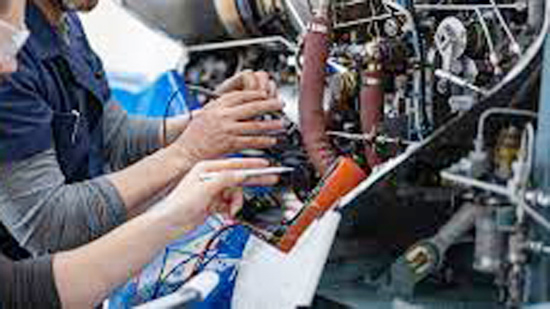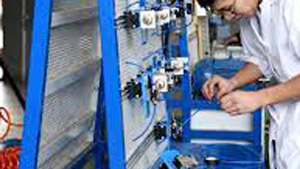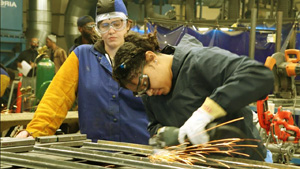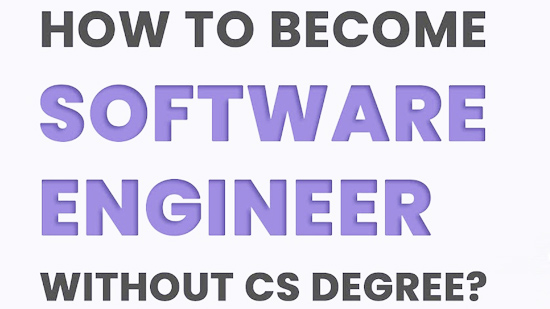Dreaming of becoming an aerospace engineer but don’t have a degree? Don’t fret! While a formal education is typically the traditional path, it’s not the only way to enter the exhilarating world of aerospace engineering. In this article, we’ll explore alternative routes and the steps you can take to make your dream a reality.

Image by exponent
Is it Possible to Become an Aerospace Engineer Without a Degree?
The aerospace industry is highly competitive, and most employers prefer candidates with a degree in aerospace engineering or a related field. It is still possible to break into the industry without a formal degree. Many successful aerospace engineers have paved their way through alternative routes, relying on experience, skills, and certifications.
Alternative Pathways to Becoming an Aerospace Engineer
Gaining Practical Experience Through Internships and Apprenticeships
One of the best ways to gain hands-on experience in aerospace engineering is through internships and apprenticeships. These programs provide aspiring engineers with the opportunity to work alongside experienced professionals and learn the ins and outs of the industry. While internships are usually shorter-term commitments, apprenticeships often span a longer period, allowing for deeper immersion in the field.
Internships and apprenticeships not only provide valuable practical skills but also offer networking opportunities, allowing you to build connections with industry professionals. Many companies also use these programs as a talent pipeline, often hiring interns or apprentices as full-time employees after their completion.
Building a Strong Foundation in Math and Science
A solid understanding of mathematics and science is crucial in the field of aerospace engineering. Without a formal degree, it becomes even more important to build a strong foundation in these subjects. Take advantage of online courses, textbooks, and resources to enhance your knowledge in areas such as calculus, physics, and mechanics.
Additionally, consider enrolling in community college courses or attending workshops and seminars that focus on aerospace-related topics. These opportunities can help you gain credibility and demonstrate your commitment to learning and growth in the field.
Self-Study and Online Resources for Aerospace Engineering
In today’s digital age, there is an abundance of online resources available for self-study in aerospace engineering. From video lectures to interactive simulations, you can access a wealth of information and educational materials right at your fingertips.
Platforms like Coursera, edX, and Khan Academy offer courses specifically tailored to aerospace engineering topics. These courses are often created in collaboration with renowned universities and industry experts, ensuring high-quality content. By engaging in self-study, you can acquire the necessary knowledge and skills to thrive in the aerospace industry, even without a formal degree.
Networking and Building Connections in the Aerospace Industry
Networking plays a crucial role in any industry, and aerospace engineering is no exception. Building connections with professionals in the field can open doors to job opportunities, mentorship, and valuable insights. Here are a few strategies to help you expand your network in the aerospace industry:
Join Professional Associations and Organizations
Consider joining professional associations and organizations related to aerospace engineering, such as the American Institute of Aeronautics and Astronautics (AIAA) or the International Astronautical Federation (IAF). These associations often host conferences, events, and networking sessions, providing opportunities to connect with industry leaders and fellow enthusiasts.
Attend Industry Conferences and Events
Stay updated on industry conferences and events, both local and international, and make an effort to attend them. These gatherings bring together professionals from various sectors of the aerospace industry, providing a platform for knowledge-sharing and networking. Be proactive and engage in conversations, ask questions, and exchange contact information with like-minded individuals.
Utilize Online Platforms and Social Media
Leverage online platforms and social media to connect with professionals in the aerospace industry. LinkedIn, in particular, is a powerful tool for networking and job searching. Create a compelling profile that highlights your skills and interests, join relevant groups, and engage in industry-related discussions. Additionally, follow influential individuals and companies on social media platforms to stay updated on the latest trends and opportunities.
Showcasing Your Skills and Projects Through a Portfolio
In the absence of a degree, it’s crucial to showcase your skills, projects, and achievements to potential employers. Building a strong portfolio can demonstrate your capabilities and dedication to the field. Here are some tips for creating an impressive aerospace engineering portfolio:
Include Relevant Projects
Highlight any projects you have worked on that are related to aerospace engineering. This could include research projects, personal experiments, or even collaborations with other enthusiasts. Be sure to provide a detailed explanation of your role, the challenges you faced, and the outcomes achieved.
Demonstrate Technical Skills
Include samples of technical work that showcase your proficiency in areas such as CAD (Computer-Aided Design), programming languages, or simulation software. If you have developed any aerospace-related software tools or algorithms, be sure to include them in your portfolio.
Emphasize Problem-Solving Abilities
Aerospace engineering requires strong problem-solving skills. Include examples of how you have tackled complex problems, both independently and as part of a team. Describe the methodologies and strategies you employed to overcome challenges and achieve successful outcomes.
Consider a Personal Website or Online Portfolio Platform
Create a personal website or leverage online portfolio platforms to showcase your work. A well-designed and organized portfolio can leave a lasting impression on potential employers and make it easier for them to assess your skills and experience.
Finding Job Opportunities in the Aerospace Field Without a Degree
While it may be more challenging to find job opportunities in aerospace engineering without a degree, it is not impossible. Here are a few strategies to increase your chances of landing a job in the field:
Apply for Entry-Level Positions
Start by applying for entry-level positions or roles that require less experience. These positions can serve as stepping stones to more advanced roles in the future. Be prepared to demonstrate your skills and passion during interviews and showcase your willingness to learn and grow within the industry.
Leverage Your Network
Tap into your network of connections in the aerospace industry. Inform them of your career aspirations and ask for referrals or recommendations. Many job opportunities are filled through referrals, so having someone vouch for your abilities can significantly increase your chances of securing a position.
Consider Small and Medium-Sized Companies
Smaller companies or startups in the aerospace industry may be more open to hiring individuals without a formal degree. These companies often value practical skills and hands-on experience over academic qualifications. Keep an eye out for job openings in these organizations and tailor your application to highlight your relevant experience and skills.
Continuing Education and Certifications in Aerospace Engineering
While a degree is not a prerequisite for entry into the aerospace industry, continuing education and certifications can enhance your knowledge and credibility. Consider pursuing the following opportunities:
Specialized Certifications
There are various certifications available in aerospace engineering that can demonstrate your expertise in specific areas. For example, the Society of Flight Test Engineers offers certification programs for flight test professionals. Research and identify certifications that align with your career goals and invest in acquiring them.
Part-Time or Online Degree Programs
If obtaining a degree is still a goal, explore part-time or online degree programs that allow you to study while working. Many universities offer flexible options for working professionals, making it possible to earn a degree while gaining real-world experience in the aerospace industry.
Continuing Education Courses
Stay updated on the latest advancements and industry practices by enrolling in continuing education courses. These courses can provide valuable insights and help you stay competitive in the rapidly evolving aerospace industry.
Conclusion
While pursuing a degree in aerospace engineering may offer a more structured and conventional path, it’s certainly not the only route to success. With determination, passion, and a strategic approach, you can embark on the journey of becoming an aerospace engineer without a degree. By gaining practical experience, building a strong foundation in math and science, leveraging online resources, networking, showcasing your skills, and continuing your education, you can increase your chances of landing a job in this exciting field.
So, if your passion for aerospace engineering burns bright but you don’t hold a degree, don’t let that deter you. Take the first step today and set yourself on the path to a rewarding career in aerospace engineering.



